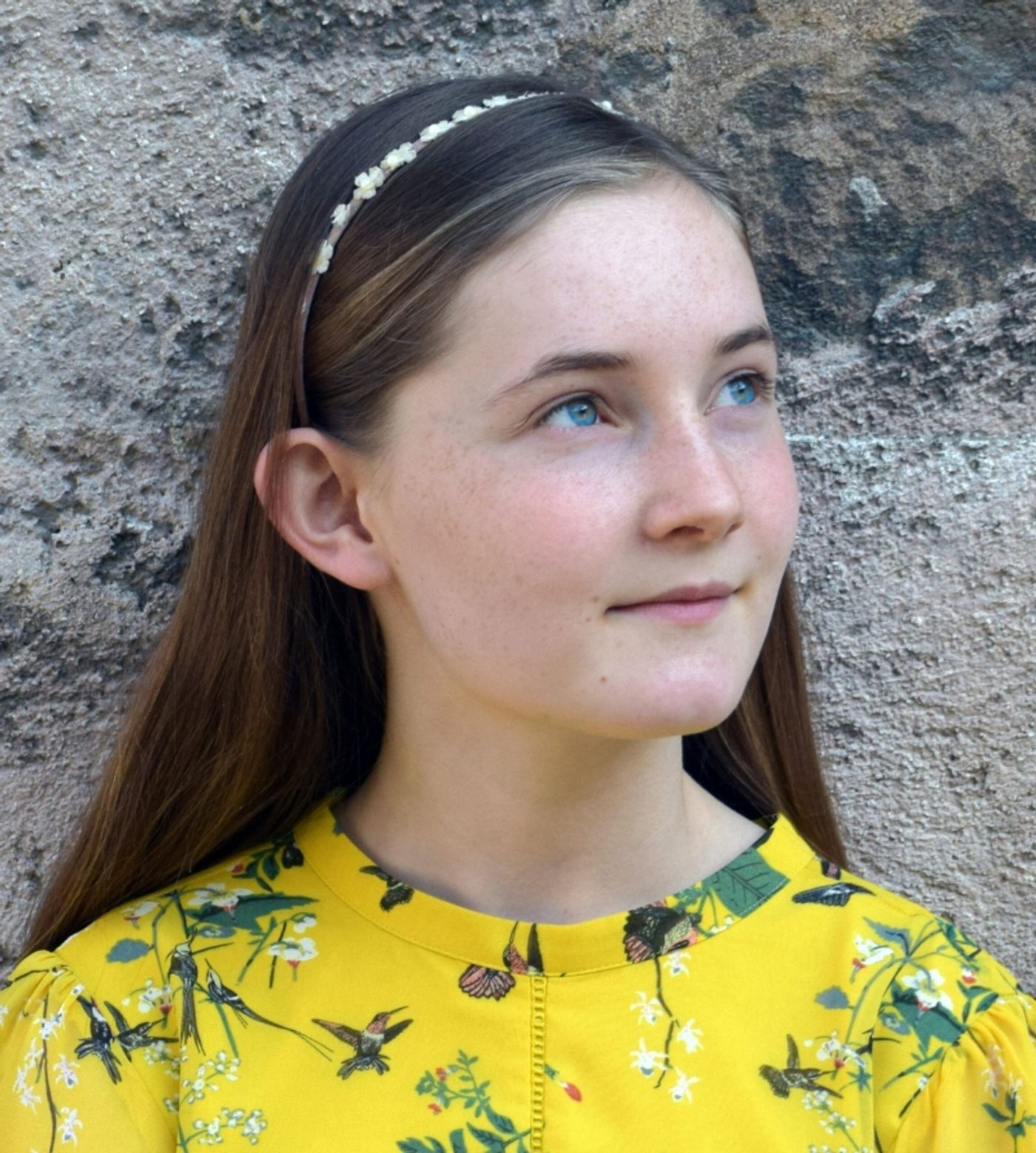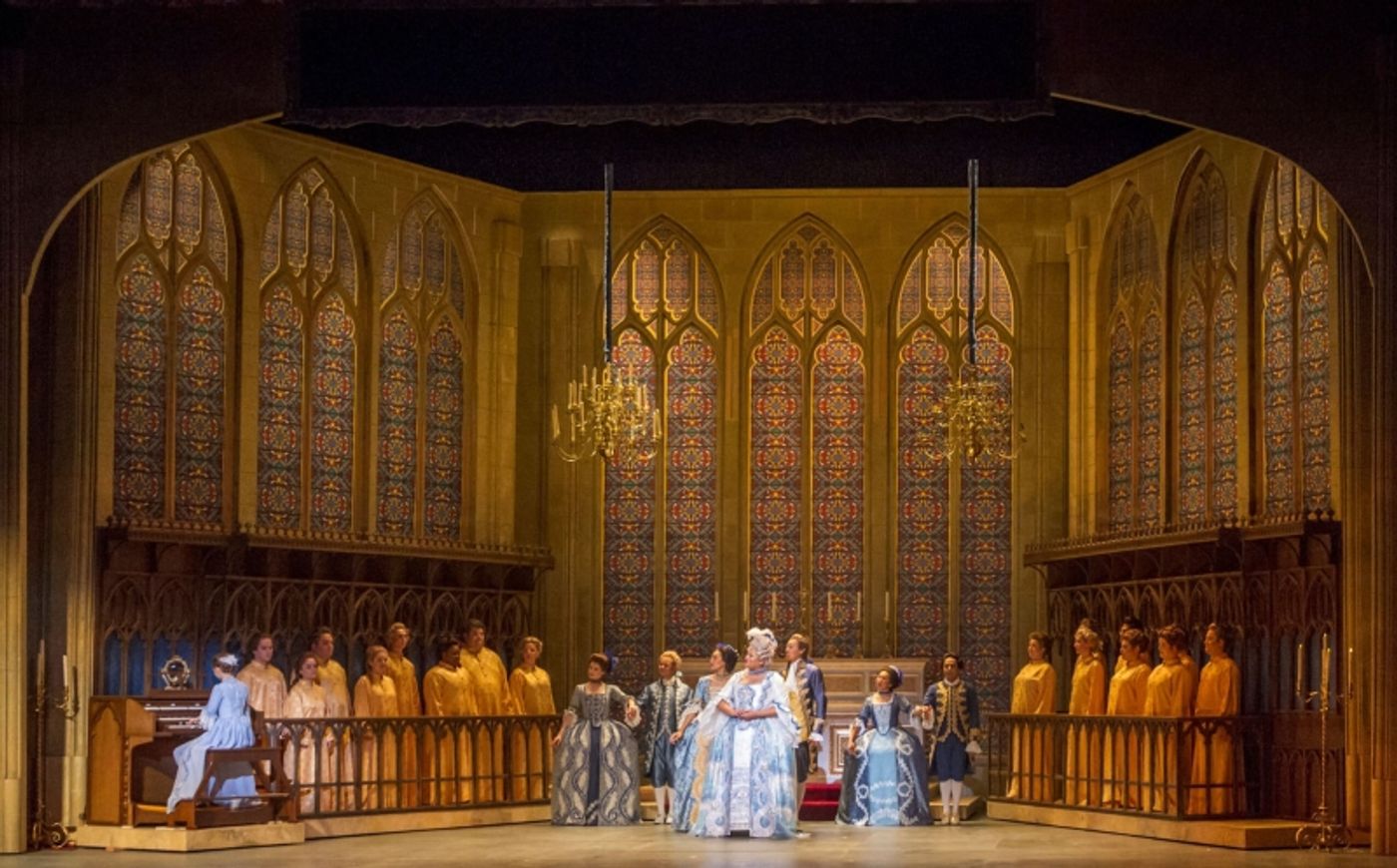Interview: Alma Deutscher of CINDERELLA at Opera San José Knows the Score - Because She Wrote It
The 17-year-old prodigy makes her international opera conducting debut in San Jose November 12 to 27

Cinderella at Opera San José
Opera San José is on quite a roll this season. Following on the heels of its effervescent Bollywood-style The Marriage of Figaro, the company is now presenting a lavish production of Cinderella with its composer, the young phenom Alma Deutscher, making her international opera conducting debut. Not that the 17-year-old lacks experience leading orchestras, mind you. Deutscher has been conducting weekly concerts this past year in Vienna where she lives and is currently a student at the University of Music and Performing Arts. Her newest work, an opera titled The Emperor's New Waltz, will have its world premiere in Salzburg this coming March.
Conducting is just the latest in a long line of exceptional achievements for Deutscher, having composed her first piano sonata at age six, and concerto for violin and orchestra when she was nine. At age 11, her Cinderella made its world premiere in Vienna in 2016, followed by a sold-out American premiere at Opera San José a year later. Deutscher reset the classic fairytale to an opera company run by a scheming stepmother where the title character is a brilliant composer laboring as a lowly copyist. Cinderella is united with her prince not because a glass slipper fits, but with the beginning of a melody only she knows how to continue. Thus, Cinderella is the heroine of her own story, rather than a victim.
I met up with Deutscher over Zoom recently from San José where she was already in the thick of rehearsals. We talked about what it's been like for her to revisit this opera she wrote as a child, how she's able to command the respect of musicians decades older than she is, her love of Golden Age musicals, and what she does to recharge when she isn't working on music. In conversation, she is direct and open, without pretense or self-importance as her brain seems to toggle between English and German in an effort to express herself as clearly as possible. I got the impression of a young woman who is confident of her talents, excited by opportunities to continue to learn and grow, and looking forward to the many places her passion for music might ultimately take her. The following conversation has been edited for length and clarity.
You composed Cinderella several years ago when you were at a very different stage in your life. What has it been like to revisit the score?
Well, I've grown up with this opera, because as you said I started it when I was 8, and then when I was 10 I wrote the first chamber version. Every year I kept on developing it and making it longer and more sophisticated and orchestrating it. And then I left it for quite a few years, and composed and orchestrated other things. About a year ago, so when I was 16, I completely revisited the score with all the experience that I had now, and I looked at it with really fresh eyes and completely re-orchestrated the whole score. And not only that, I actually changed the music as well. I mean, the melodies are the same, but I tried to bring out the emotion, the drama and the humor in the music much more. I've made it more comfortable for the singers so that it's in their perfect ranges and I added some vocal fireworks for the stepsisters and the stepmother. I made it much better, I think, so I'm very excited to hear this version. And conduct it!
Does it feel to you that we're finally heading into a new era for women conductors?
Yes, I think it's changed quite rapidly in really just the last few years, so in that sense I am quite lucky that I live now and not fifteen years ago. And I am conducting my own music, so I know how I imagined it and how I want it to sound, exactly what I want from the music. So it makes a lot of sense that I'm conducting, because I'm the composer.

(photo by John Draginoff)
This is stating the obvious, but you're still really, really young to be a conductor. Did you always want to conduct?
Well, I probably have quite a lot more experience than it might seem, in that I've been doing quite a bit of backseat conducting for many years when my music was performed - and probably to the annoyance of many conductors. [laughs] I would sit with the score and then go to the conductor and say, "Well..." And I would watch all the time, how to take the rehearsals in the most efficient way and not waste time. Then at some point I thought I should really be in the position that I can interpret my own orchestral music myself. Because when I play piano or violin, I can interpret it as I want, and now I can interpret my operas or orchestral music on my own.
What do you think makes a really great conductor?
I think first of all you have to have very good hearing. You need to hear if one person in an orchestra plays a wrong note, you know like when the second or third horn or the trombone or tuba plays a wrong note or comes in at the wrong time. If you don't hear that, then you immediately lose the respect of the orchestra. And then as well you need to be clear to hold the orchestra together. That's the basic thing, being together, and it is often underestimated how much time it takes to really make sure everyone is playing at the same time.
After that comes the musicality, really inspiring the orchestra to play beautifully and musically, so that it's not just playing the notes. It's an interpretation, and they need to know from you how you want them to sound. And then there's time management and managing people as well, deciding what's important and what's not so important so you don't get stuck on things. So - you have a lot to think about.
Is it at all intimidating for you as a 17-year-old to be up in front of all those adults? You are in control of the rehearsal room, and it's up to you to make sure the necessary work gets done.
Well, this year I've had quite a lot of experience conducting because I've been giving every week concerts in Vienna where I conduct a small orchestra. I have a short, quarter-of-an-hour rehearsal right before every concert where I can just quickly rehearse new pieces. I may not have time to rehearse everything that we're going to play, so I have to be really clear and efficient, and I've learned a lot from that. I also conducted a concert in Toronto a few weeks ago. It was all my music, with a large orchestra and singers, and then we played some arias from my new opera. So that's how I got so much confidence - from experience, from doing it. I know I can do it because I've done it many times before.
This is the first time I've conducted an opera, but I've also watched so many times how others do things and so I'm quite confident that I will have the authority and that I will not be intimidated. You have to get the balance right - you need to make people like you, otherwise they'll not try hard for you, and you can't come across as bossy or unreasonable, but you need to set the standards. If there's something important, then I will insist on getting it.
You've been in the spotlight since you were seven, so I would guess you're probably used to being the youngest person in the room?
That's true. I am quite used to working with adults. I think ever since I was seven or eight I have been working with adults who have been playing my music, and I remember they often found it a bit strange in the beginning, taking orders from a 7-year-old [laughs] teaching them how to play the music. But then normally once they actually heard the music and saw "she knows what she's talking about," they knew we would work really well together. Now I'm not a little child anymore so it's easier for people. I mean, still it's true that I'm very young compared to most conductors, but because it's my music as well they accept everything, and they also see that I know what I want, how I want it to sound.
What can you tell me about The Emperor's New Waltz, your opera that will be premiering in Salzburg in March?
That's a romantic comedy mixed with a satire, [based on the] Hans Christian Andersen tale "The Emperor's New Clothes" and also about classical music and pop music coming together. The two main characters - one is this girl obsessed with classical music, especially Mozart, and she's quite snippy about pop music, and the other is a gardener, Jonas, who's this very talented singer-songwriter and he's in love with her from afar. It's very funny, and it'll be very exciting.
When you're not working on music, how do you like to spend your time?
I absolutely love dancing. It's one of my biggest passions now. In Vienna there is a lot of ballroom dancing, so it's something that all young people do. It's just an amazing way of relaxing and being graceful. All types of dances, so waltzing but also I'm trying quickstep, tango. And then I like going for walks as well just to get a bit of fresh air. It's so quiet and just being in nature and hearing the birds, that's also where I get inspiration. And I like swimming and writing stories, being creative.
Is there any chance you might someday write for musical theatre?
Well, my next opera is actually [somewhere] between an opera and a musical, so I think in English it would be called a musical.
Cool, so you're already way ahead of me!
Yes! [laughs]
Your music is so melodic and accessible that I can see you having a lot of success in musical theatre.
Well, I love the Golden Age musicals. I love Irving Berlin, Cole Porter, Rodgers & Hammerstein, Bernstein, West Side Story, Fred Astaire, and I like Andrew Lloyd Webber's music as well. I like generally musicals with beautiful tunes, beautiful melodies that really stay in your head.
That's interesting to me. I mean, I'm much older than you are, but I love those same old musicals even though they were written before I was born, so...
You know, I don't think it's important when a piece of music was written. It's just important, do you like it or not, is it beautiful, does it speak to your heart? It doesn't matter at all if it was written five seconds ago or five hundred years ago.
---
Opera San José's production of Alma Deutscher's Cinderella, sung in English with English supertitles, will be performed November 12-27, 2022 at the California Theatre, 345 South 1st Street, San Jose. For more information or to purchase tickets, visit operasj.org or call (408) 437-4450.

Videos

